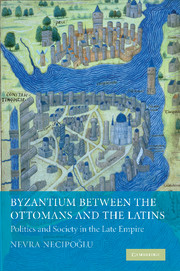Book contents
- Frontmatter
- Contents
- List of maps
- Acknowledgements
- Note on transliteration
- List of abbreviations
- Map 1 The Byzantine world in the fourteenth–fifteenth centuries
- Map 2 Byzantium and its neighbors, c. 1350
- Map 3 Byzantium and its neighbors after 1402
- PART I INTRODUCTION AND POLITICAL SETTING
- PART II THESSALONIKE
- PART III CONSTANTINOPLE
- PART IV THE DESPOTATE OF THE MOREA
- 9 The early years of Palaiologan rule in the Morea (1382–1407)
- 10 The final years of the Byzantine Morea (1407–1460)
- Conclusion
- Appendix I Archontes of Thessalonike (fourteenth—fifteenth centuries)
- Appendix II “Nobles” and “small nobles” of Thessalonike (1425)
- Appendix III Constantinopolitan merchants in Badoer's account book (1436–1440)
- Appendix IV Members of the Senate of Constantinople cited in the synodal tome of August 1409
- Appendix V Some Greek refugees in Italian territories after 1453
- Bibliography
- Index
9 - The early years of Palaiologan rule in the Morea (1382–1407)
Published online by Cambridge University Press: 07 December 2009
- Frontmatter
- Contents
- List of maps
- Acknowledgements
- Note on transliteration
- List of abbreviations
- Map 1 The Byzantine world in the fourteenth–fifteenth centuries
- Map 2 Byzantium and its neighbors, c. 1350
- Map 3 Byzantium and its neighbors after 1402
- PART I INTRODUCTION AND POLITICAL SETTING
- PART II THESSALONIKE
- PART III CONSTANTINOPLE
- PART IV THE DESPOTATE OF THE MOREA
- 9 The early years of Palaiologan rule in the Morea (1382–1407)
- 10 The final years of the Byzantine Morea (1407–1460)
- Conclusion
- Appendix I Archontes of Thessalonike (fourteenth—fifteenth centuries)
- Appendix II “Nobles” and “small nobles” of Thessalonike (1425)
- Appendix III Constantinopolitan merchants in Badoer's account book (1436–1440)
- Appendix IV Members of the Senate of Constantinople cited in the synodal tome of August 1409
- Appendix V Some Greek refugees in Italian territories after 1453
- Bibliography
- Index
Summary
Ever since the Fourth Crusade, followed by the creation of a number of Frankish principalities and the settlement of Venetians in various parts of the Peloponnese, political instability had become a persistent trait that characterized the region. Some order and prosperity were restored to the Byzantine possessions of the peninsula during the long administration of the Despot Manuel Kantakouzenos (r. 1349–80), who asserted his authority over the insubordinate Greek landlords and made favorable alliances with the neighboring Latin princes and states. Yet the region's volatile political situation remained unchanged as military struggles continued among the different powers competing for control in the peninsula and as frontiers kept shifting accordingly. About the time of Manuel Kantakouzenos' death in 1380, the Frankish principality of Achaia in the North had long been broken up into several small fragments; Corinth was held by the Florentine Nerio Acciaiuoli; the Catalan duchy of Athens across the Gulf of Corinth had come under the protection of the Aragonese; and the Venetians still held onto the port cities of Coron and Modon, as well as some neighboring rural areas in the southern Peloponnese. The years shortly preceding 1380 also saw two groups of newcomers in the Morea, namely the Hospitallers of Rhodes and the companies of Navarrese mercenaries, of whom the latter in particular brought further confusion and disorder to the peninsula.
- Type
- Chapter
- Information
- Byzantium between the Ottomans and the LatinsPolitics and Society in the Late Empire, pp. 235 - 258Publisher: Cambridge University PressPrint publication year: 2009



